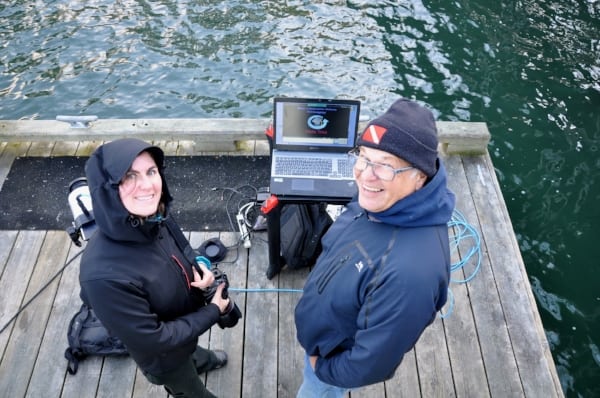Marine ecologist, biologist, and explorer Maeva Gauthier is the founder of the Fish Eye Project, an innovative venture that uses technology to connect children and adults with the world’s oceans. With their program, you can see, hear, communicate and share in the discovery of spectacular marine environments in real time, all without ever getting wet.
We chatted with Maeva about the Fish Eye Project this week.
SDTC: What are practical things we can do today to help save our oceans?
MG: We have the power as consumers. Be curious, ask questions, think twice. I can see two things that are relatively easy to do that can make a big difference:
1) Reduce the use of plastic. Many things we use are made out of plastic and many end up in our oceans: water bottles, plastic bags, etc. I’m challenging myself every day to find ways to reduce plastic consumption and it’s not easy! It’s everywhere. Well, it’s starting to be everywhere in the oceans too and we eat it when we eat shellfish and fish. So, we better start reducing the problem at the source.
2) Download an app to help you make ocean-friendly choices. Where is this fish coming from? Where was it caught? Which seafood or fish should I avoid to not support the depletion of those species or destructive fishing practices? The Ocean Wise App can help you make those decisions on the go.
What was the best question you’ve gotten from a kid during your Fish Eye Project?
It’s funny. I always thought that people would mainly ask questions about the animals we see underwater, but a question that was interesting to me was, “How do you feel?” and “Are you scared?” I realized that doing a live event is an experiential tool. People feel part of the adventure and part of the team and they wonder how you feel so they can feel those sensations too. I feel the pressure on our body, I feel calm because of the subdued sounds underwater, and sometimes I feel a bit cold depending on how long I’ve been down there.
A funny question we had from a young kid was, “Do you see SpongeBob SquarePants?” After that, we got a SpongeBob toy to place it on future dive sites as a joke!
What does the Fish Eye Project have in store for 2017 that you’re really excited about?
We’re going up north! We’ve been asked to join the Canada C3 project, a major project for Canada 150th. The Icebreaker will leave Toronto on June 1st, go through the Northwest Passage and end up in Victoria, where I live, on October 28th. We’ll be doing a Live Dive from Cambridge Bay in the Arctic to connect ALL Canadians to our Arctic Ocean at the end of August. The event will be streamed online in major museums across the country.
We’ll then hop on the ship for a week to go to Kugluktuk and take in the amazing Arctic environment. I love the Arctic and I can’t wait to go back. We are also in discussion with a few groups internationally who want to learn how to do Live Dives or stream their amazing environments to connect with their audience or new audiences in an immediate and authentic way. We’re hoping to launch those new Live Dive destinations in the next year. Where would you like to go diving right now without getting wet?
What was your most memorable dive? What happened?
Each dive is special in some way! We’re so lucky to be able to dive at any time of the year in Victoria because of the warmer climate. The biodiversity in these waters is just mind-blowing because of the cold water – more oxygen dissolves in cold waters. On a recent dive, I surfaced and a seal pup just swam by me and came to check me out. It was definitely memorable and surprising.
What should we be paying more attention to, in your opinion?
Global issues need local action and it starts with us. There is hope and we have to focus on what we have and what we can do, rather than on what is going wrong. I see too much doom and gloom and not enough about the wonders, the beauty, and the solutions.
Every second breath we take comes from the ocean. With every drop of water we take, we’re connected to the ocean. It’s our life-support system even if many of us live far away from it.
Ocean literacy is crucial to connect kids to the ocean and create the next wave of ocean stewards. Ocean literacy is barely present in many provinces and they often rely on teachers to take on that initiative. Projects like the Ocean School and the Ship2Shore program by Ocean Networks Canada are great steps to get students excited about our ocean. People protect what they know and love, so let’s have more ocean education in our schools so we can build more awareness.
Maeva appears in the new CBC series, WE ARE CANADA, which airs Sunday evenings at 7 p.m.



 Follow Us On Instagram
Follow Us On Instagram
